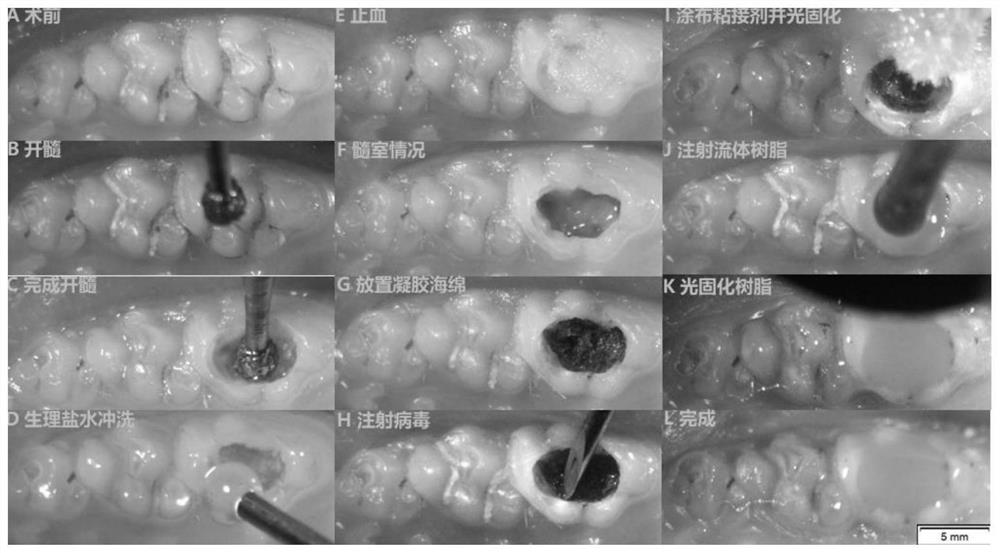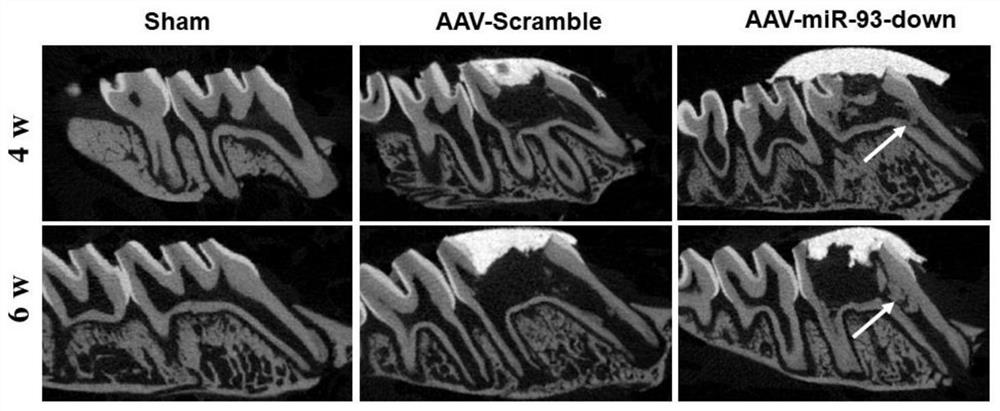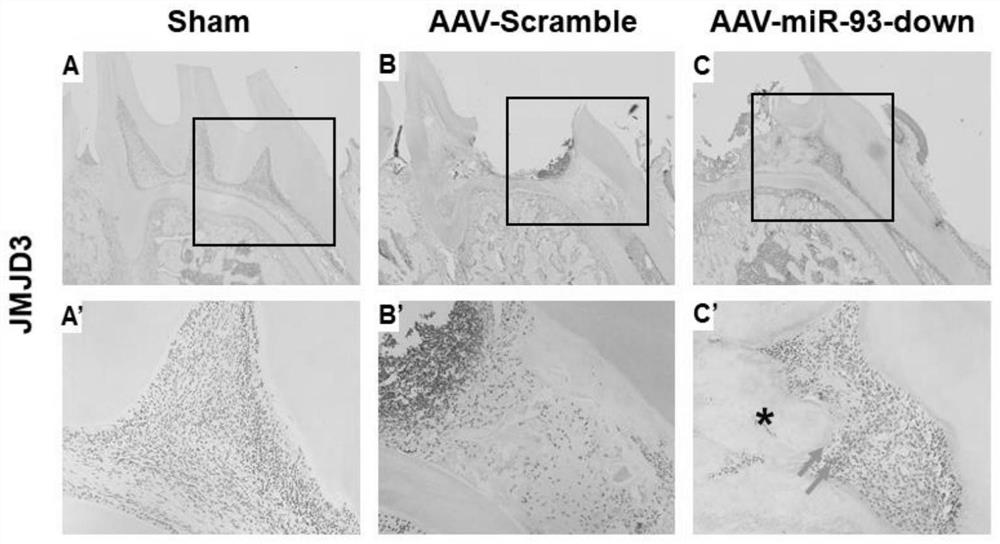Use of mir-93 inhibitors in the preparation of medicines for repairing dentin
An inhibitor and dentin technology, applied in the field of dentin regeneration drugs, can solve rare problems, and achieve the effect of making up for the lack of curative effect and having a good application prospect.
- Summary
- Abstract
- Description
- Claims
- Application Information
AI Technical Summary
Problems solved by technology
Method used
Image
Examples
Embodiment 1
[0030] Example 1 miR-93 expression down-regulation virus promotes dentin formation in vivo
[0031] 1. Method
[0032] 1.1 Plasmid construction and virus embedding
[0033] Use AAV Helper-Free System to produce recombinant AAV particles (i.e. miR-93 expression down-regulation virus), which can down-regulate miR-93 expression in dental pulp stem cells. It is a preferred miR-93 inhibitor of the present invention, and its process is as follows:
[0034] 1) Design the target fragment of rat-derived miR-93-5p (rno-miR-93-5p), that is, the reverse complementary sequence CTACCTGCACGAACAGCACTTTG (SEQ ID NO.1) of miR-93-5p. The above sequence was cloned into the viral vector GV479, which was the experimental group (AAV-miR-93-down group). The sequence inserted into the control group (AAV-Scramble group) was CGCTGAGTACTTCGAAATGTC (SEQ ID NO.2). The viral vector contains an inverted terminal repeat (ITR) sequence and a multiple cloning site (MCS) segment. The sequence of its elements...
Embodiment 2
[0050] Example 2 Culture and Identification of Human Dental Pulp Stem Cells
[0051] 1. Method
[0052] Clinically collected tooth samples aged 12-25 due to orthodontic needs or impacted teeth extraction, rinsed the isolated teeth repeatedly with sterile saline, placed them in PBS and collected pulp tissue samples within 2 hours. A dental split drill cuts around the neck of the tooth to expose the pulp cavity. The pulp tissue was removed with a sterilized pulp extraction needle, and the operation should be gentle to avoid tissue damage. The extracted dental pulp tissue was rinsed with sterile PBS solution, and placed in a pre-configured ordinary medium (DMEM medium containing 15% fetal bovine serum FBS and 1% double antibody). Use sterile ophthalmic scissors to cut up the pulp tissue as much as possible, transfer it to a 1.5mL EP tube, add 1mL Type I collagenase (3mg / mL), and incubate in an incubator for 1.5 hours, with vigorous shaking every 10 minutes during the period , ...
Embodiment 3
[0058] Example 3 Downregulation of miR-93 expression virus promotes the differentiation of dental pulp stem cells to form odontocytes and secrete dentine matrix
[0059] 1. Method
[0060] The P2 generation of human dental pulp stem cells obtained in Example 2 was inoculated in a six-well plate, and when the confluence reached 90% and the cells were in good condition, mineralization induction medium (OM) was added to induce odontogenic differentiation, 37 °C, 5% CO 2 The cells were cultured in an incubator under certain conditions, and the cells were replaced every other day. Cells in the undifferentiated stage (day 0, 0d), early stage of differentiation (day 7, 7d), and late stage of differentiation (day 14, 14d) were collected, and the total RNA containing microRNA in the cells was extracted using miRNeasy Kit (Qiagen Inc). cDNA was synthesized according to the operating procedures of the reverse transcription kit, and the expression patterns of miR-93 and target genes JMJ...
PUM
 Login to View More
Login to View More Abstract
Description
Claims
Application Information
 Login to View More
Login to View More - R&D
- Intellectual Property
- Life Sciences
- Materials
- Tech Scout
- Unparalleled Data Quality
- Higher Quality Content
- 60% Fewer Hallucinations
Browse by: Latest US Patents, China's latest patents, Technical Efficacy Thesaurus, Application Domain, Technology Topic, Popular Technical Reports.
© 2025 PatSnap. All rights reserved.Legal|Privacy policy|Modern Slavery Act Transparency Statement|Sitemap|About US| Contact US: help@patsnap.com



